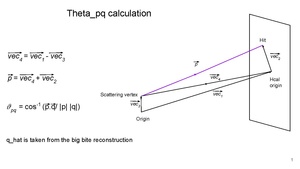GEn Analysis Meeting August 01 2024 10AM EST
From SBS wiki
Back to SBS Main Wiki >> GEn Analysis Meetings
Agenda
Attendance
Kate, Arun, Vimukthi, Gordon, Bogdan, Faraz, Jimmy, Nilanga, Saru, Todd, Xiaochao, Jacob, Gary, Hunter
Minutes
- Does this method have advantage over dx/dy cuts?
- P_perp has maximum ~75MeV/c for He3
- Evaluate P_perp cut with different W cuts
- Try much tighter cuts to test it
- We need TOF
- Can look at region of accidentals
- We are seeing P_perp in the right units now - good
- In the future, simulation could be used to look at inelastics
- For now, timing can be used on data
- q vector direction is calculated from BB track reconstruction
- use energy of scattered electron as measured by BB
- what if you assume an energy that is equal to what you would have in the case of elastic scattering?
- GMn is calculating dx and dy:
- "angles only" - purely elastic scattering (method 1)
- "4-vector" - use energy measured by BB (method 2)
- Could investigate the different methods and the possible shift in q
- How much of a shift compared to assuming no fermi motion?
- Do we need a different approach to the background?
- A student should take the machinery and run it for GEn
- We know momentum distribution of He3 from physics: where do we get these values? Reference? [1]
- Misak's code?
- Look at Freddy's thesis as well
- Even if you have a good shell model description of wave function, when you measure, you miss fraction of nucleons that have a certain momentum
- We now associate with short range correlations - are we trying to get a distribution of momenta? Issue of missing strength?
- Page 5 of proposal [2]
- GMn uses a simc generator, but GEn currently uses the G4 inelastic generator
What is the status of timing calibrations for GEn?
Meeting link information
See email invitation, or contact Arun Tadepalli for Zoom link.
